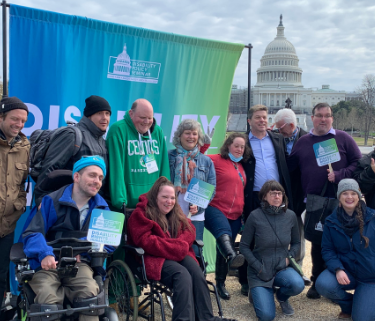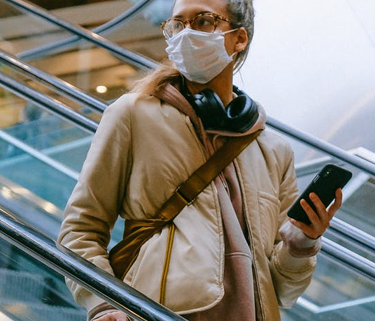Intersection of Disability & Race Explored at Free, DEI Virtual Conference: Civil Rights Advocate Kimberlé W. Crenshaw & Disability Activists to Present
BROOKVILLE, N.Y. – As issues at the intersection of disability and race remain under-recognized due to a lack fluency or awareness, nonprofit agencies AHRC Nassau and The Arc of the United States are responding with a free, online conference on Wednesday, May 18, 2022 to connect attendees of all abilities and backgrounds with research, best practices, and most importantly, with each other.
The Diversity, Equity & Inclusion (DEI) Virtual Conference, “Beyond the Comfort Zone: Understanding and Eradicating Injustice, Racism and Inequality in the Field of Developmental Disabilities,” will explore the history, the latest research, and opportunities for the increased inclusion of people with intellectual and developmental disabilities (IDD) as well as recognition for direct care staff, who are primarily Black, Indigenous, and people of color (BIPOC).
“Disability is an underdeveloped area of DEI. For those with no prior connection to the experience of disability or the underlying issues related to race, there can be shame and hesitation in trying to discuss these issues—or worse, silence,” said Stanfort J. Perry, Conference Chair and CEO of AHRC Nassau. “The purpose of this online conference is to create a platform offering the latest insight on the intersectionality of issues pertaining to ableism and racism—to encourage questions, conversations, and above all, shine a spotlight on those whom society has marginalized.”
More than 30 years since the passage of the Americans with Disabilities Act, people with disabilities remain one of the most marginalized groups – at high risk of violent crimes to contracting and dying from COVID-19. Their essential support staff, who make tasks of daily living and participation in the wider community possible, are predominantly women of color who have spent years advocating for a living wage. According to a report from the University of Minnesota – Institute on Community Integration and The National Alliance for Direct Support Professionals, “Black/African American Direct Support Professionals (DSPs) were paid less per hour than white DSPs, and a higher percentage of Black/African American DSPs worked 40 or more additional hours per week.”
Though there is overwhelming need, an overall lack of funding has resulted in a 43% national turnover rate in the direct care workforce and a staffing crisis. Self-advocates, like Jessica Campbell, have advocated for years for necessary funding to ensure services and supports to lead an independent life. “Imagine not being able to get medication, access money, stay clean, cook, do your job, or go out into the community—that’s what a staffing crisis means to us,” said Campbell, who is currently a member of AHRC Nassau’s Board of Directors and a Field Assistant for the Long Island Region at the Self-Advocacy Association of New York State.
The upcoming DEI Virtual Conference is important to Campbell because in addition to addressing some of these issues during a conference panel, she hopes “more people have a chance to be understood and that more people can begin to understand the experience of disability.”
For Peter Berns, CEO of The Arc of the United States, “Disability providers, at the state and federal level, are working within legal, legislative, and service frameworks that can be complex and difficult to navigate regardless of whether you receive services, work in the industry, or seek to understand as an outside observer.
“Within these systems, people with disabilities and their direct care staff can become further and further removed from the action of daily life, and lead lives in parallel to their peers without disabilities—with few interactions, largely unseen and unheard,” said Berns. “The DEI Virtual Conference speaker lineup will offer valuable perspectives on how meaningful change must be the result of collective partnership and advocacy across all facets of society.”
Conference keynote and civil rights advocate Dr. Kimberlé W. Crenshaw will provide insight into the “intersectionality” framework—a concept she pioneered—addressing how overlapping identities, such as disability, gender identity, and race, can lead to complex, and sometimes under-recognized, issues of inequity and inequality. Dr. Crenshaw currently serves as the Isidor and Seville Sulzbacher Professor of Law at Columbia Law School, as well as a Distinguished Professor of Law at the University of California, Los Angeles.
Examining the existing support systems and how to reach a more inclusive future is the focus of the plenary session lineup. Plenary Speaker Kerri E. Neifeld, Commissioner of the Office for People With Developmental Disabilities (OPWDD) in New York State, will present how her office is working to stabilize, professionalize, and strengthen the direct support workforce following the pandemic, while also advancing diversity, equity and inclusion in the developmental disabilities field.
Plenary Speaker Tawara Goode, Associate Professor and Director, Georgetown University National Center for Cultural Competence, will evaluate cultural and linguistic competence in the industry’s collective efforts to advance DEI, and more specifically, what it means to achieve outcomes in the IDD space, while Plenary Speaker Atif Choudhury, CEO of the UK-based company, Diversity & Ability, will share insights from his lived experience and career on topics ranging from how to evaluate an organization’s progress toward a fully inclusive culture to proactive acknowledgments of intersectionality.
“The quality of insight and dedication to advancing social justice outcomes at this conference is exceptional,” said Perry. “With more than 30 sessions, including speakers from a variety of professional disciplines and backgrounds, we are anticipating a day of learning and connection that advances a more inclusive and equitable future for all. That’s why the conference recordings and an event toolkit will be freely available for a year following the event. This event is intended to serve as a resource, informing and empowering more organizations and individuals.”
The DEI Virtual Conference “Beyond the Comfort Zone: Understanding and Eradicating Injustice, Racism and Inequality in the Field of Developmental Disabilities” will be held on Wednesday, May 18 from 8:30 a.m. – 6 p.m. ET at ahrc.org/deiconference. The event is free and open to all. Closed captioning will be available for all sessions; American Sign Language is available for plenary and select sessions.
FREE NASW Continuing Education Credits Available NASW-NYS is recognized by the New York State Education Department’s State Board for Mental Health Practitioners as an approved provider of continuing education for licensed social workers (Provider ID #0014), licensed mental health counselors (Provider ID #MHC-0053), and licensed marriage and family therapists (Provider ID #MFT-0037), and licensed psychologists (Provider ID #PSY-0088)
About Us
AHRC Nassau, a chapter of The Arc New York, is one of the largest agencies in New York State supporting people with intellectual and developmental disabilities (IDD). Based in Nassau County, the nonprofit empowers people to lead fulfilling lives, together with family, friends and community. AHRC’s programs include a wide array of supports for people with disabilities and their families, including vocational and employment services, adult day habilitation and community-based services, guardianship, family support services and respite/ recreation opportunities, as well as residential services. AHRC Nassau is part of an elite group of international agencies accredited by CQL | The Council on Quality and Leadership for Person-Centered Excellence Accreditation With Distinction. AHRC is also one of four agencies accredited by New York State’s Office for People With Developmental Disabilities as a Compass agency, which is the highest level of accreditation offered. For more information, visit www.ahrc.org.
The Arc of the United States advocates with and serves people with intellectual and developmental disabilities (IDD), including Down syndrome, autism, Fetal Alcohol Spectrum Disorders, cerebral palsy, and other diagnoses. The Arc has a network of nearly 600 chapters across the country promoting and protecting the human rights of people with IDD and actively supporting their full inclusion and participation in the community throughout their lifetimes. For more information, visit thearc.org.
For more information, please contact Nicole Zerillo, assistant director of Community Resources, AHRC Nassau, at 516.626.1075, ext. 1134, or nzerillo@ahrc.org.
SOURCE AHRC Nassau
Editor’s Note: The Arc is not an acronym; always refer to us as The Arc, not The ARC and never ARC. The Arc should be considered as a title or a phrase.














